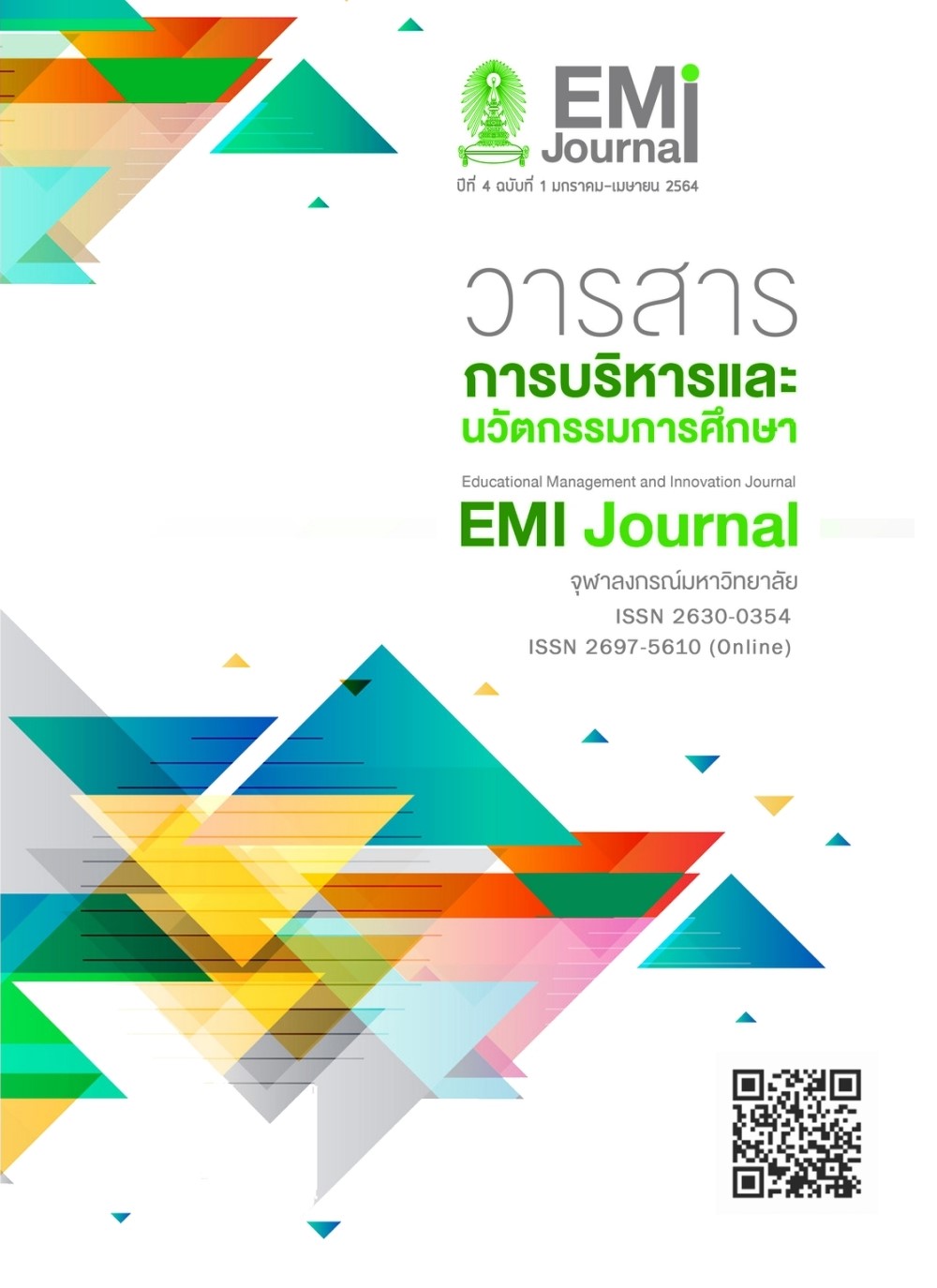แนวทางพัฒนาการบริหารวิชาการของโรงเรียนในสหวิทยาเขตราชบุรี 4 ตามแนวคิดนักคิดเชิงออกแบบ
คำสำคัญ:
Academic Management, Design Thinker, Secondary Schoolบทคัดย่อ
-
Downloads
เอกสารอ้างอิง
Brown, T. (2008). Design thinking. Harvard Business Review, 86(6), 84-92.
Brown, T. (2009). Change by design: How design thinking transforms organizations and inspires innovation. New York: Harper Business.
Carrol, M. P. (2014). Shoot For The Moon! The Mentors and the Middle Schoolers Explore the Intersection of Design Thinking and STEM. Journal of Pre-College Engineering Education Research (J-PEER), 4(1).
Carroll, M. (2014). Learning from What Doesn’t Work: The Power of Embracing a Prototyping Mindset. Retrieved from web.stanford.edu/group/redlab/cgi-bin/publications_resources.php
Chammuang, C. (2009). Test Guide for school director and education administrators. Bangkok. [in Thai]
Department of Education, (2008). Evaluation and Selection of Learning Resources. Charlottetown, Prince Edward Island.
Dewey, J. (1938). Experience and Education. Retrieved from http://www.schoolofeducators. com/wp- content/uploads/2011/12/EXPERIENCE-EDUCATION-JOHNDEWEY.pdf
Duening, T. N. (2008). Five Minds for the Entrepreneurial Future: Cognitive Skills as the Intellectual Foundation for Next Generation Entrepreneurship Curricula. paper published at the 2008 Conference of the USASBE, Jan.
Dunne, D., & Martin, R. P. (2006). Design Thinking and How It Will Change Management Education: An Interview and Discussion.
El Mhouti, A., Nasseh, A., & Erradi, M. (2013). Development of a tool for quality assessment of digital learning resources. International Journal of Computers Applications, 64(14).
Graves, C. (2014). What Is a Makerspace?, Knowledge Quest, 42(4), 8-13.
Gallagher, A., & Thordarson, K. (2018). Design Thinking for School Leaders: Five Roles and Mindsets that Ignite positive change. Alexandria, Virginia USA: ASCD.
Hawthorne, G. et al. (2014) Impact and sustainability of creative capacity building: the cognitive, behavioral, and neural correlates of increasing creative capacity, in H. Plattner et al. (Eds.), Design Thinking Research: Building Innovation
Eco-Systems. Cham, Switzerland: Springer, pp. 65-77.
Hong, S., & Kwek, D. (2011). Innovation in the Classroom: Design Thinking for 21st Century Learning.
Stanford EDU. (2011). http://www.stanford.edu/group/redlab/cgi-bin/materials/Kwek- Innovation In The Classroom.pdf
HPI School of Design Thinking. (2015). Design thinking at scale. Retrieved from https://hpi.de/meinel/knowledge-tech/innovation-research/design-thinking-at- scale.html
International Society for Technology in Education. (2000). ISTE national educational technology standards (NETS). Eugene, OR: International Society for Technology in Education.
Koh, J. H. L., Chai, C. S., Benjamin, W., & Hong, H. Y. (2015). Technological Pedagogical.
Kolb, D. (1984). Experiential Learning: Experience As The Source Of Learning And Development.
Lande, M. (2011). Underpinnings for learning design thinking: Mindsets and processes for becoming an adaptive design thinker (forthcoming publication). Lor, Rex. (2017). Design Thinking in Education: A Critical Review of Literature.
Luchs, M. (2016). A brief introduction to design thinking. In M. Luchs, K. Swan & A. Griffin (Eds.), Design thinking: new product development essentials from the PDMA (pp. 1-12). Hoboken: (NJ): Wiley.
Ministry of Education. (2007). Ministerial Regulations define rules and procedures for decentralization of administration and education. (2007, 16 May). Royal Gazette. Vol. 124 Part 24 a. [in Thai]
Noipinit, P., Supap, W., & Klineam, C. (2016). An Effect of Using Design Thinking Process in the Topic of Conic Sections to Enhance Creative Problem Solving Ability of Grade 10 Students. Journal of Rangsit University: Teaching & Learning, 13(1) January
-June 2019. [in Thai]
Owen, C. (2007) Design thinking: notes on its nature and use. Design Research Quarterly, 2(1), 16-27.
Roozenburg, N., Chen, L., Stappers, P., Leurs, Bas, Mulder, Ingrid & Van Waart, Peter. (2011). Developing a Human-Centered Attitude Through Experiential Learning.
Rowe, P. (1987). Design Thinking. Cambridge, MA: The MIT Press. Royalty, A., Oishi, L., & Roth, B. (2014). Acting with creative confidence: Developing a creative agency assessment tool. In H. Plattner, C. Meinel, & L. Leifer (Eds.), Design thinking research. Building innovation eco systems (pp. 79-96). Cham: Springer.
Saskatchewan Ministry of Education. (2008). Learning Resources Evaluation Guidelines. Regina, SK: Saskatchewan Ministry of Education.
Scheer, A., & Plattner, H. (2011). Transforming Constructivist Learning into Action: Design Thinking in education. Design and Technology Education: An International Journal, 17(3), 8-19.
Schweitzer, J., Groeger, L., & Sobel, L. (2016). The design thinking mindset: An assessment of what we know and what we see in practice, Journal of Design, Business & Society, 2(1), 71-94.
Taylor, B. (2016), Evaluating the Benefit of the Maker Movement in K-12 STEM Education, Electronic International Journal of Education, Arts, and Science (EIJEAS), Vol. 2.
Thai government gazette. (2018). National Strategy A.D. 2018-2037. Retrieved from https://www.nesdc.go.th/download/document/SAC/NS_PlanOct2018.pdf
UNICEF Thailand. (2019). Education for the 21st Century: Placing skills development at the heart of education. Retrieved from https://www.unicef.org/thailand/stories/ education-21st-century
Vehachart, R. (2007). Administrational management and school base basic. Songkhla: Thaksin University. [in Thai]
Viseshsiri, P. (2012) Academic administration and quality assurance handout for course 2747732. Bangkok: Chulalongkorn University. [in Thai]
Von Thienen, J., Royalty, A., & Meinel, C. (2017). Design thinking in higher education: How students become dedicated creative problem solvers, 306-328.
White House. (2014). President Obama to host first-ever White House Maker Faire. Retrieved from https://obamawhitehouse.archives.gov/the-press-office/2014/
/18/fact-sheet-president-obama-host-first-ever-white-house-maker-faire
Wonganutaroj, P. (2010). Academic administration. Bangkok: Bangkok Supplementary Media Center. [in Thai]



